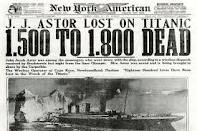The Titanic and KZFR don’t have much in common; one was opulent, fatally flawed and short-lived; the other is simple, lean, self-correcting and has great longevity. But April marks the anniversary of the sinking of the Titanic and it is also KZFR’s pledge month, so any listeners who become supporters and call in a pledge while American Pastimes is on the air will be offered an additional premium ‘thank you’ gift: “American Pastimes: Songs of the Titanic,” a CD containing a rich collection of music inspired by the ice berg’s assault on the famous boat.
When the ship left England
heading for a far shore
The rich declared that wouldn’t ride with the poor
They sent the poor below, they were the first to go
Wasn’t it sad when that great ship went down.
When the Titanic sailed in 1912 it was the greatest technological marvel of the new 20th century that quickly became the first great mass disaster of the new century. Its loss became prime fodder for folklore and musical commemoration. Every one everywhere was aware of the disaster and captivated, not just by the numbers of lost souls, but by who was lost; the wealthy and the elite -- people “of character and importance” as the Washington Post flatly stated -- people who mattered.
What becomes interesting is that most of the Titanic-related songs that developed in the months and years immediately following the disaster were authored by African-American songsters. America in the post-Reconstruction era had reached the nadir of its race relations; the African-American community in 1912 was feeling as isolated from the mainstream and as persecuted as ever before. The promise of freedom and equality had been lost. To the black community the story of the great ship was a morality tale that featured the literal ice cold hand of God reaching out to punish greed, vanity and the arrogant pride of the wealthy and powerful white society that produced the ship. Historian Louis Henry Gates points out that “as the news [of the sinking] fanned out, the versions that African Americans divined, informed by the forces of discrimination, decadence and disaster, gave rise with stunning immediacy to a series of two tall tales: the first about an actual person, the great boxer, Jack Johnson, and the second about a mythical character known only as “Shine,” supposedly the lone black passenger who miraculously survived by swimming halfway across the Atlantic.”
The derogatory racist name of “Shine” became embraced by the black community as a legendary trickster figure; a bad-ass hero who shows up in street poetry, “the dozens” spoken-word contests, toasts and music. Shine makes his appearance in a toast about the Titanic tale. He’s shoveling coal in the engine room until he confronts the captain about the ship’s predicament: “Your words sound happy and your words sound true. But this is one time your word won’t do. Because I don’t like chicken and I don’t like ham. And I don’t believe your pumps are worth a damn.” So Shine leaves the captain and the boat to its fate and as the floating palace settles beneath the north Atlantic he’s swimming away: “When all them white folks went to heaven Shine’s in Harlem drinking Seagram’s Seven.”
While officially there were no black people on board**, the unfounded rumor circulated that the boxing champion Jack Johnson was supposed to be a passenger but was barred from boarding because of his color. Johnson was internationally renowned and with his ability to pulverize white men and marry white women with impunity he was the living incarnation of bad-ass Shine. Rumor became folklore and made its way into many versions of the Titanic song:
Jack Johnson wanted to get on board
Captain he said “I ain’t haulin’ no coal
Fare thee, Titanic, Fare thee well
In these verses we hear that at worst Johnson was no more than coal to the captain, and at best the champion might have been only worthy of shoveling coal for the captain. But we also infer the irony that Jim Crow segregation could be beneficial. Like lamb’s blood smeared over an ancient doorway, it had provided magical protection to African-Americans from the punishment that God had directed at the guilty. In that vein it became a celebration. Gates writes, “Johnson’s and Shine’s tall tales hit the streets of Harlem….and were wildly popular throughout the black community, almost like a most joyful ritual of racial revenge.” But the facts behind the folklore wouldn’t keep it confined to the black community.
The compelling story naturally spread to wider audiences. In this case, the inordinate amount of drowning of 3rd Class steerage passengers (75% lost) and 2nd Class passengers (57% lost) compared to 1st Class (only 37% lost) keenly illustrated the undeclared class war that took place on board the doomed liner. As newspaper testimony increasingly pointed to the abandonment of “woman and children first!” in favor of “1st Class first!” a chord was struck across the nation. Then it was reported that crew members who were fortunate enough to survive had been left stranded in Canada because they had been terminated from employment by White Star Lines retroactive from the precise time that the ship went down. All working people could feel the outrage and appreciate the sentiments behind the songs, and so, soon enough white string bands and country musicians were adding versions to their repertoires.
Early 20th century field research by a variety of song collectors (the first was in 1916) put the array of Titanic tunes on the radar of music publishers, and some versions ended up being eventually recorded by popular professionals like Roy Acuff and the Carter Family. The songs were published as sheet music under a variety of titles with an assortment of arrangements and lyrics: “Didn’t That Ship Go Down,” “Husbands and Wives,” “It was Sad When that Great Ship Went Down,” and “God Moves on the Water.” In some of these publications the lessons and themes of racism and social class that had inspired the original songs were often reinterpreted or ignored. Social and economic justice became co-opted by popular performers and by publishers; the “Boy Scouts of America Campfire Sing-A-Long” book was not going promote radical notions of class consciousness when the Titanic could better serve malleable young minds as a metaphor for the unpredictability of life or the need for personal courage. Gospel singers used the event to emphasize the need for personal salvation, and hit records weren’t going to be sold without watering down the original message. It took the folk revival of the 1950’s to recall the original context and the original emphases, but by then, a half a century after the vessel sunk, the sense of tragedy had dissipated and the new versions of the old songs could be more upbeat; the lyrics a bit more jaunty, even humorous.
**In fact there was a black Haitian who was traveling from his home in France with his white French wife and their children. His name was Joseph Laroche. He didn’t survive but his family did. His presence on board was lost in the historical record until 80 years later.
KZFR’s American Pastimes: “Songs of the Titanic”
1. Mance Lipscomb - The Titanic (God Moves on the Water)
2. Richard Rabbitt Brown - The Sinking of the Titanic (Nearer My God)
3. Rory Block - Wasn’t it Sad When That Great Ship Went Down
4. Bobby Buford - Titanic (Husbands & Wives)
5. Bill Jackson - Titanic Blues
6. Ma Rainey - Titanic Man Blues
7. Frank Hutchinson - The Last Scenes of the Titanic
8. The Cofer Brothers - The Great Ship Went Down
9. The Carter Family - Titanic
10. Tom, Brad & Alice - The Great Titanic (Wasn’t It Sad…)
11. Roy Acuff - The Great Titanic (Wasn’t It Sad….)
12. Dean Sapp & the Harford Express - The Night the Titanic Went Down
13. The Dixon Brothers - Down With the Old Canoe
14. Dan Zanes - Titanic
15. Spider John Koerner - Titanic
16. Hans Theessink - Titanic
17. Jaime Brockett - Legend of the USS Titanic
18. Harry Chapin - Dance Band on the Titanic
19. The Sacred Shakers - Titanic (God Moves on the Water)
20. Bright Newton - Titanic









